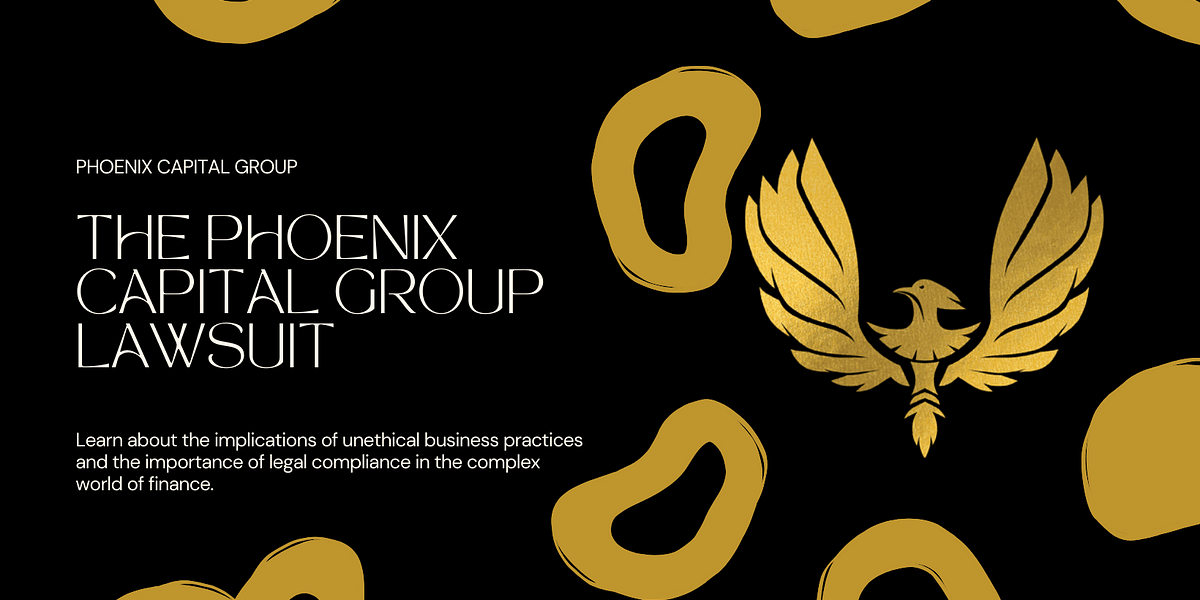The Phoenix Capital Group lawsuit involves a legal case where multiple parties have raised serious concerns about the company’s business practices. This lawsuit revolves around allegations of misconduct, misleading information, and other potentially unlawful activities that have impacted investors and customers alike. Understanding the details of this lawsuit is important for anyone involved with or considering an investment in Phoenix Capital Group.
Why Did the Phoenix Capital Group Get Sued?
Phoenix Capital Group is facing a lawsuit primarily due to allegations of fraudulent activities and misleading business practices. The plaintiffs in the case claim that the company provided false or deceptive information to investors, resulting in significant financial losses. The lawsuit suggests that Phoenix Capital Group may have misrepresented its financial health, investment strategies, or the risks associated with its offerings, leading to damages for those who trusted the company with their investments.
The legal action against Phoenix Capital Group highlights concerns over transparency and ethics in their business dealings. Allegedly, the company engaged in practices that were not only misleading but also potentially harmful to the financial well-being of its investors. These actions have raised red flags among regulators and industry watchdogs, prompting a closer examination of Phoenix Capital Group’s business conduct.
Who Is Involved in the Lawsuit?
The lawsuit against Phoenix Capital Group involves several key parties. On one side, there are the plaintiffs, who are mostly current or former investors that feel wronged by the company’s actions. These individuals and groups are seeking compensation for their losses and are pushing for greater accountability and transparency from Phoenix Capital Group.
On the other side is Phoenix Capital Group itself, including its executives and key decision-makers, who are accused of orchestrating or allowing the allegedly deceptive practices. Additionally, the case may involve regulatory agencies, legal experts, and financial analysts who are closely monitoring the developments. The lawsuit has also attracted attention from media outlets and the general public, given the potential implications for investor rights and corporate accountability.
What Are the Main Claims in the Lawsuit?
The lawsuit against Phoenix Capital Group includes several main claims that underscore the seriousness of the allegations.

Who Filed the Lawsuit?
The lawsuit was filed by a group of investors who claim to have suffered financial losses due to Phoenix Capital Group’s alleged misconduct. These plaintiffs argue that they were misled by the company’s statements and marketing materials, which presented a more favorable picture of the company’s financial health and prospects than was accurate.
What Did Phoenix Capital Group Do Wrong?
Phoenix Capital Group is accused of multiple wrongdoings, including providing misleading information about its investment strategies and financial stability. The plaintiffs allege that the company exaggerated its earnings, minimized the risks associated with its investment products, and failed to disclose critical information that would have influenced their decision to invest. These actions are considered deceptive and potentially fraudulent, violating various securities laws.
How Is This Lawsuit Affecting People?
This lawsuit is having a significant impact on various stakeholders, including current and former investors, employees, and even prospective clients. Many investors have suffered substantial financial losses and face uncertainty regarding the recovery of their investments. The company’s employees are also affected, facing potential layoffs, reputation damage, and a turbulent work environment. Additionally, prospective clients and partners are likely to reconsider their associations with Phoenix Capital Group, given the ongoing legal battle and the potential risk involved.
What Could Happen Next in This Case?
The next steps in the Phoenix Capital Group lawsuit will likely involve extensive legal proceedings, including discovery, where both parties gather evidence to support their claims. There could be pre-trial motions, hearings, and potentially even a trial if the case does not settle beforehand. If Phoenix Capital Group is found liable, it may face hefty fines, penalties, and mandatory restitution payments to the affected investors.
Moreover, the company may be subject to increased scrutiny from regulatory bodies like the Securities and Exchange Commission (SEC) and could face additional lawsuits from other investors or parties who believe they were wronged. The outcome of this lawsuit could set a precedent for similar cases in the future, emphasizing the need for transparency and ethical conduct in the financial industry.
What Does the Phoenix Capital Group Say?
Phoenix Capital Group has maintained its innocence in the face of the allegations and has publicly stated that it intends to fight the lawsuit vigorously. The company argues that it has always acted in good faith and in accordance with the law. Phoenix Capital Group insists that it has provided accurate and transparent information to its investors and that any losses incurred were due to market conditions or other external factors beyond its control.
The company has also emphasized its commitment to resolving the matter as quickly as possible while continuing its operations. They claim that the lawsuit lacks merit and is an attempt by disgruntled investors to recover losses that are a normal risk of investing. However, the court will ultimately decide whether these defenses hold weight.
What Are the Legal Steps in This Case?
The legal process for the Phoenix Capital Group lawsuit involves several steps:

What Is the Court’s Role?
The court’s role is to ensure a fair and impartial hearing of the case. This involves overseeing the legal proceedings, admitting relevant evidence, and ruling on procedural motions filed by either party. The judge will also provide instructions to the jury, should there be one, on how to interpret the law as it applies to the facts of the case. The court’s decision will determine whether Phoenix Capital Group is found liable for the claims made against it.
When Will the Lawsuit Be Resolved?
The resolution of the lawsuit depends on various factors, including the complexity of the case, the amount of evidence presented, and the court’s schedule. Lawsuits of this nature can take several months or even years to resolve. If the case goes to trial, the process could be prolonged further, especially if there are appeals following the initial judgment.
What Can You Do If You Are Affected?
If you are an investor or stakeholder affected by the Phoenix Capital Group lawsuit, it is crucial to stay informed about the case’s progress. Consider consulting with a legal professional who specializes in securities law to understand your rights and potential avenues for recourse. Additionally, monitor official communications from Phoenix Capital Group and regulatory bodies to ensure you are aware of any updates or required actions.
Has This Happened Before?
While this specific lawsuit is unique to Phoenix Capital Group, similar cases have occurred in the financial sector. Many companies have faced legal challenges related to alleged fraudulent activities, misleading investors, or failing to disclose critical information. These cases often highlight the importance of regulatory oversight and the need for transparency in financial transactions. They serve as a reminder for investors to conduct thorough due diligence and remain cautious when making investment decisions.
The Bottom Line
The Phoenix Capital Group lawsuit represents a significant legal battle with potentially far-reaching implications for both the company and its investors. While the case unfolds, it serves as a critical reminder of the importance of transparency, honesty, and ethical practices in the financial industry. For investors, staying informed and understanding their rights is essential to navigate the complexities of this case and protect their interests.





